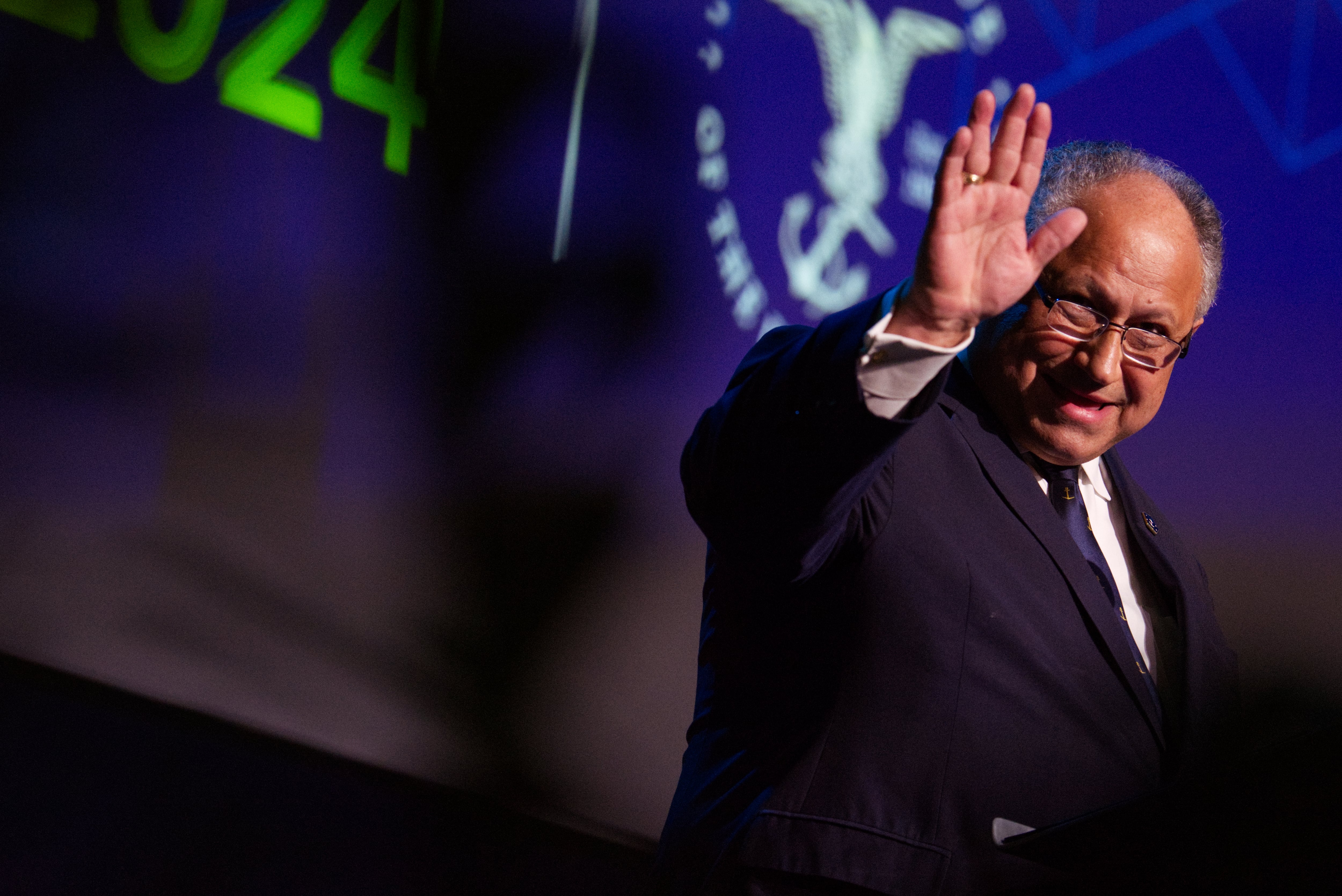Secretary of the Navy Carlos Del Toro violated the Hatch Act for statements voicing support for President Joe Biden during a work trip to the United Kingdom in January, according to the U.S. Office of Special Counsel.
While civilian Defense Department employees like Del Toro are permitted to publicly back political candidates in a personal capacity, the Hatch Act bars federal officials from participating in political activities while serving in their official capacity and in their federal workplace.
The Office of Special Counsel said Thursday that Del Toro breached this policy during several interviews representing the Defense Department to garner backing for Operation Prosperity Guardian, a U.S. and international mission to safeguard shipping vessels in the Red Sea, the Bab al-Mandeb, and Gulf of Aden.
“When speaking in his official capacity on a taxpayer-funded trip, Secretary Del Toro encouraged electoral support for one candidate over another in the upcoming presidential election,” Special Counsel Hampton Dellinger said in a statement Thursday. “By doing so, he crossed a legal line and violated the Hatch Act.”
RELATED

“This is especially troubling because Secretary Del Toro has himself acknowledged that military work and partisan politics should not be mixed,” Dellinger said. “As he stated just this past July: ‘It is more important than ever for us to remember that the [Department of the Navy] is an apolitical body… Public trust and confidence depend on this.’”
During an appearance at the Royal United Services Institute on Jan. 25, Del Toro fielded a question regarding concerns the U.S. could adopt a more isolationist approach in the event of a different administration following the 2024 election. In response, Del Toro said that the U.S. and the world “need the mature leadership of President Biden.”
“I’m confident that the American people will step up to the plate come November and support President Biden for a second term as our Commander-in Chief, so that we can continue to work together as free democratic countries respect each other around the globe,” Del Toro said.
Later that day, Del Toro made similar remarks about the world deserving a second term with Biden in the White House in an interview with BBC News Sunday.
Del Toro self-reported his comments on BBC News Sunday on Feb. 1, noting that he aimed to address the significance of strong international alliances and national security issues.
“In retrospect, I believe my response should have been delivered more broadly without reference to specific candidates,” Del Toro wrote.
After opening an inquiry into the incident, the Office of Special Counsel later learned of Del Toro’s remarks at the Royal United Services Institute.
Del Toro’s lawyer defended these statements, pointing out they were not included in prepared remarks, were “fragments of answers” provided in response to questions from foreign press, and that Del Toro had no intent to influence the election. Del Toro’s attorney also said that failing to answer questions from the BBC’s Laura Kuennsberg could have also portrayed a bad image and indicated a lack of support for the current administration.
“Failing to be responsive may well have suggested to her — and the BBC audience — that Secretary Del Toro was not fully supportive of the US President. That could well have proved embarrassing on the international stage to Secretary Del Toro, President Biden, and the Biden Administration,” Del Toro’s attorney, Michael Bromwich, said in a letter to the Office of Special Counsel.
Still, the Office of Special Counsel said that self-reporting the comments on BBC did not “absolve” Del Toro from misconduct and that he did back a second Biden term in the White House.
“Secretary Del Toro’s statements with overt reference to the election conveyed electoral support for one candidate and opposition to another candidate, and thus, constituted political activity,” the Office of Special Counsel said in their report on the matter.
As a result, the Office of Special Counsel referred the matter to the White House for further appropriate action. Penalties for violating the Hatch Act include removal from service, reduction in grade, a reprimand, or a civil penalty up to $1,000.
Pentagon Pentagon Spokesperson Sabrina Singh told reporters Thursday that the Defense Department is aware of the Office of Special Counsel’s report, and noted that Deputy Secretary of Defense Kathleen Hicks approved a memo this year outlining political engagement processes for military and civilian Defense Department personnel.
Ahead of the presidential election in November, Del Toro released guidance in July instructing commanding officers to review limitations on political activities with their sailors, since the Department of the Navy is an “apolitical body.”
Banned activities for active duty sailors include attending partisan political events as a service member, writing partisan political articles or letters that attempt to sway votes for a candidate or cause, and speaking before a partisan political gathering.





